Premature Babies: How to Estimate & Adjust Age for Starting Solids
- How do I know how old my baby is in adjusted or corrected age terms...and how does that differ from chronological age?
- What other signs of readiness to feed are important to consider once I do know my baby's adjusted age indicates it's close to the time to start solid foods?
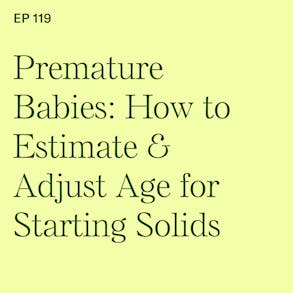
LISTEN TO THIS EPISODE
Episode Description
When can premature babies start solid foods? If your baby was born before 40 weeks gestation you might have heard the term “adjusted age”. In this episode we’re analyzing this concept of adjusted or corrected age and determining what it’s telling us about your baby’s readiness to start solid foods.
Babies who were born early need additional time to catch up developmentally before they are safe to start solid foods. Learn how to calculate your baby’s adjusted age, how long you need to use this corrected age for and the other signs to look for if you’re analyzing whether or not your premature baby is ready to start the transition to solid foods.
Links from this Episode
- Baby-Led Weaning with Katie Ferraro program with the 100 First Foods™ Daily Meal Plan, join here: https://babyledweaning.co/program
- Baby-Led Weaning for Beginners free online workshop with 100 First Foods™ list to all attendees, register here: https://babyledweaning.co/baby-led-weaning-for-beginners
Other Episodes Related to this Topic

Latest Episodes
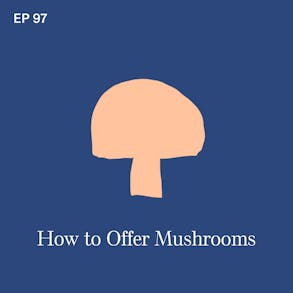
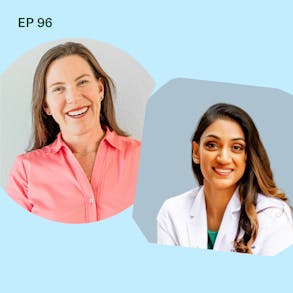
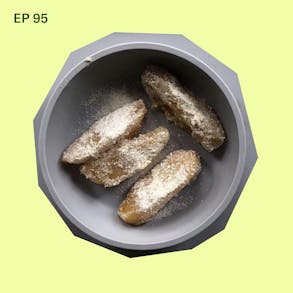
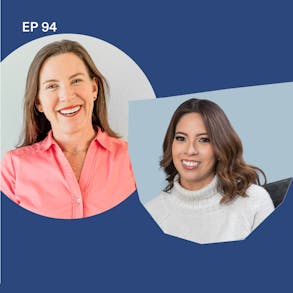

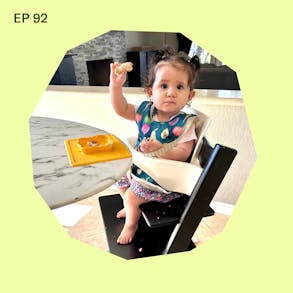
Katie Ferraro (1s):
So we're basing expectations about what the premature baby can do from a developmental standpoint on their adjusted age, not their chronological age. We proceed from there, see if the baby has the other signs of readiness to eat and then we ask if it's safe to start solid foods. Hey, there I'm Katie Ferraro, registered dietitian, college nutrition professor and mom of seven specializing in baby led weaning. Here on the baby led weaning made easy podcast, I help you strip out all of the noise and nonsense about feeding, leaving you with the confidence and knowledge you need to give your baby a safe start to solid foods using baby led weaning.
Katie Ferraro (42s):
Well, hello there and welcome back today. We're talking about premature babies and how to estimate and adjust your baby's age when it comes time to start solid foods. Now, I like to start each of these mini baby led weaning training episodes with a BLW tip of the day. And today's tip very straightforward. You want to wait until your baby is six months adjusted age before starting solid foods. And I'll explain exactly how you calculate that in a second. So hang tight because I'm going to be sharing a little bit more about the other signs of readiness to feed that you need to look for on top of the baby being at or around the six month mark. And we make that the six month adjusted mark, if we are talking about premature babies.
Katie Ferraro (1m 25s):
I'll also be sharing some tips for parents who had babies just close to, but not exactly at full term. Do you have to adjust the age before trying to start solid foods with those babies as well? All right. So let's dive in talking about premature babies and how to estimate and adjust the age for starting solid foods. Let's get going first with some terminology. You sometimes hear the adjusted age compared to the chronological age. So what is the chronological age? We'll start there first. Chronological age is your babies actually age. Like how many months ago did that baby exit your womb and enter the world? That's your baby's chronological age, weeks, or months or years, what have you Corrected age, on the other hand, you might also hear corrected or adjusted age referred to as the post conceptual age.
Katie Ferraro (2m 11s):
But for the sake of this podcast episode, we'll be talking about adjusted age, which is the same thing as your baby's corrected age. And the way you calculate the baby's corrected age is you take your baby's chronological or actual age minus the number of weeks or months that that baby was premature and that equals their corrected age. So again, corrected age equals chronological age minus number of weeks or months of prematurity. So I'll give you an example. I had quadruplets and they were born at 34 weeks gestation. So full term is 40 weeks, right? If they were born at 34 weeks, that means they were six weeks premature. So when people would ask me, oh, are you going to start feeding the quads?
Katie Ferraro (2m 51s):
Because they're six months old. Now I would say no, because chronologically they're six months old, like their six month birthday was today, but because were six weeks early, they're adjusted ages. They're really only four and a half months. You don't feed a four and a half month old baby. It's not safe. I have to wait until they were six months plus six weeks. So they were essentially seven and a half months chronological age before we even thought about starting solid foods. So why does this adjusted age matter? Well, if your baby is born early, the baby's brain and the rest of the neurological system, as a few other systems, they need a little bit of extra time to catch up, right? The developmental expectations of your premature baby. It's based on your baby's corrected age and not their chronological age.
Katie Ferraro (3m 35s):
So our expectation about a baby being able to safely eat anything, except breast milk or formula needs to be predicated on that same timeframe of the adjusted age and not just the chronological age. Sometimes parents wonder how long then do we need to adjust for, well context of starting solid foods. We start solid foods at, or around the six month adjusted age mark plus when the baby is showing the other signs of readiness to feet and I'll get to those in a second, but most child and infant developmental specialists will advise that we use this corrected or adjusted age approach up until the time the child is around two or two and a half. In other cases, you'll sometimes hear a formula referred to where we multiply the number of weeks of prematurity times 10 to give the number of weeks that we then adjust for.
Katie Ferraro (4m 21s):
So if your baby was 12 weeks premature, so let's take quadruplets, a different family. For example, gestational period for quadruplets is 28 weeks. So when I found out I was pregnant with quadruplets, they said the good majority of pregnant women with quadruplets will only go to one any weeks. That's 12 weeks premature. I was very fortunate to go 34 weeks. My babies were only six weeks premiere. Sure. And they still needed time in the NICU to grow into thrive, but their health outcomes, six weeks premature versus 12 weeks, very different. And I would have had to do a very different adjustment pattern if they were 12 weeks premature. If you have a baby who's 12 weeks premature born at 28 weeks gestation, 12 weeks times 10 equals 120 weeks, which is about two years in months until you would expect the catch-up to be assessed.
Katie Ferraro (5m 4s):
No, that doesn't hold true for every baby. And of course, every baby is different, but sometimes in this context of the discussion about premature babies, parents may be incorrectly advised to start solid foods for their premature baby early. You'll hear guidance all the time, not all the time, but more often than we should. You'll hear parents being told, oh, your baby needs to start solid foods early to help with catch-up weight. And I need you to know that we do not encourage babies to quote-unquote, catch up with their weight from foods. Babies don't know how to eat food yet. They need time to learn how to eat, and we should always be fortifying their breast milk or their formula if they need to be gaining weight and actually did a whole podcast interview episode on this very topic with an expert in the area of growth and development.
Katie Ferraro (5m 52s):
If you've been told your baby needs to start solids to catch up, that's not true. Go listen to episode 110 called catch-up weight. Why starting solids early will not help your baby gain weight? That's with Rosan Meyer, she's a pediatric dietician and a PhD who again, specializes in growth and development from a nutrition standpoint. She's got great information for you on how to counteract that bad advice that unfortunately people are still giving. So when we talk about the adjusted age, it's in the context of helping your baby or helping you, I guess, as the primary feeder know when it's time to start solid foods, but age is not the only thing we're looking for, right? In addition to your baby being six months adjusted age, baby needs to be sitting relatively unassisted, needs to be interested in food and mouthing objects, and then gradually that disappearance of the tongue thrust reflex, that protective mechanism where babies push everything out of their mouth early on prior to the time they're safe to eat, that starts to disappear as they're getting ready. So if you're interested in learning more about giving your baby a safe start to solid foods, when your baby's ready, I teach a free online workshop each week. It's called baby led weaning for beginners. It's all about how to get your baby to eat 100 foods before turning one, without you having to spoon feed purees or buy pouches. So everybody on this free workshop gets a copy of my 101st foods list. So when it's time for your baby to eat, you'll know which foods they can eat, and you can sign up for this week's workshop times. If you go to the show notes page for this episode, which is at blwpodcast.com forward slash one one nine. So we've got to have all those things in unison, right? Six months adjusted or corrected age sitting relatively unassisted, interested in food, mouthing objects, gradual disappearance of the tongue, thrust reflux. And then we're going to be ready to start solid foods. Reminder though, all babies get ready to eat on their own schedule. And when we're talking about prematurity, a lot of you are dealing with multiples. I'm a mom of multiple multiples. I have a set of quadruplets. I also have a set of twins. My quadruplets are born at 34 weeks. So I waited until they were six months plus six weeks. So they were seven and a half months chronological age before we even started. But you know what? They all ate at their own pace. One of our quadruplets, Henry, he put his head down on the table for an additional five weeks. He was not interested in participating in food with his three siblings who were exactly the same age as him. They picked it up at the seven and a half month chronological age mark. He was almost nine months chronological age before he picked his head up and started participating in meals. And you know what? It was perfectly fine because breast milk and or formula will continue to be the majority of your baby's nutrition early on in the weaning period. So don't stress if right out of the gate, your baby's not interested in feeding. It's very, very slow going at the beginning for most babies and your premature babies. It might take them a little bit longer, but they can, and definitely will thrive with baby led weaning if you give them the time to learn how to eat. Now, I mentioned, I also had a set of twins. They were born at 38 weeks. That's considered to be full term for twins. So I remember thinking, gosh, well, what am I going to do with these guys? When they turn like exactly six months of age, am I going to start solid foods? And to be honest, I'm a little bit lazy. We were on vacation at their six month mark and I didn't want to start solid foods when I wasn't at home with my safe high chairs. So I probably could have started on their chronological date of six months, but I waited until they were six months plus two weeks. And if I can tell you anything that I've learned from doing baby led weaning with six of my own seven children, and now tens of thousands of other families, it is that it is always better to wait. On the side of safety, six months plus one week or six months, plus two weeks, you are not doing reparable damage to your baby. If you do not start solid foods right on their six month birthday, you could however, be doing a lot of harm if you start too early. And that's because of the risk of choking is much higher if the baby is not truly physiologically, ready to eat. So with the twins I waited also until they were six months plus two weeks, they were really eager to start solid foods. They were sitting relatively unassisted, much better than they had even two weeks prior. And to you and me were like one week, two week big deal. It doesn't matter. It does matter in the context of your baby's developmental capabilities and their lifespan, right? A lot changes in one or two weeks when you're six months old or approaching six months old. So I say, when in doubt, wait, it is always safer and certainly much more fun to feed a baby who is truly ready to start solid foods. So there you have it hope you guys learned a little bit about how to adjust your baby's age and why it's important to do that if your baby was premature, when it comes time to start solid foods. I'll link up the resources I mentioned in this episode, including the link to sign up for this week's free baby led weaning for beginners workshop. That will all be on the show notes for this episode, which you can find at blwpodcast.com forward slash one, one nine. Thanks for listening. Bye now.

The Program Baby-Led Weaning with Katie Ferraro
A step-by-step digital program for starting solid foods safely and navigating the original 100 FIRST FOODS™ meal plan with baby-led weaning.
 EXPERT-LED, PROVEN APPROACH TO EATING REAL FOOD
EXPERT-LED, PROVEN APPROACH TO EATING REAL FOOD CONCISE VIDEO TRAININGS TO MASTER BABY-LED WEANING
CONCISE VIDEO TRAININGS TO MASTER BABY-LED WEANING 100 FIRST FOODS DAILY MEAL PLAN WITH FOOD PREP VIDEOS
100 FIRST FOODS DAILY MEAL PLAN WITH FOOD PREP VIDEOS
Baby-Led Weaning for Beginners Free Workshop
Is your baby ready to start solid foods, but you’re not sure where to start? Get ready to give your baby a solid foundation to a lifetime of loving real food…even if you’re feeling overwhelmed or confused about this next stage of infant feeding.
Get baby-led weaning recipes and tips delivered to your email inbox.

